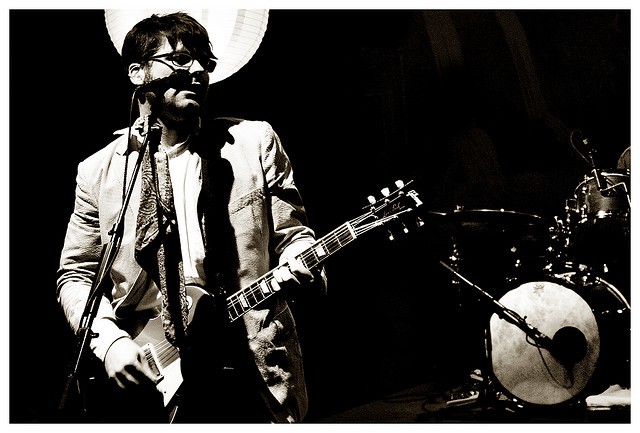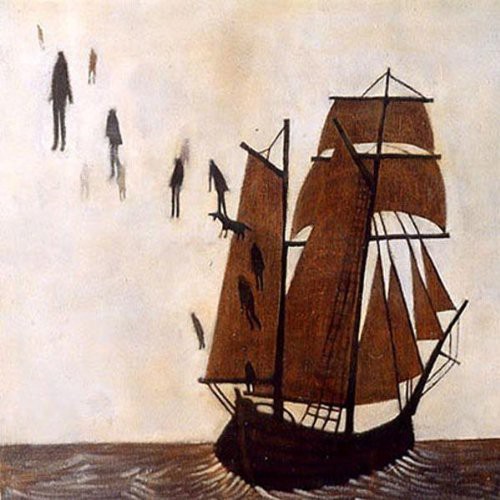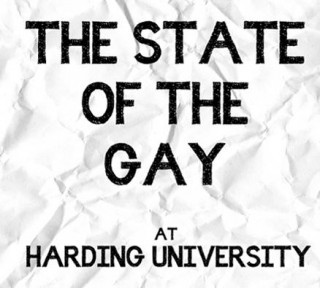The New Decemberists Album: It Contains 100% Less Raping
by L.V. Anderson

The Decemberists’ new album, The King Is Dead, takes the band in a new direction: tamer, more pastoral lyrics and a pared-down, bluegrass-tinged sensibility (with guest vocals from the always-excellent Gillian Welch). Critics have taken note, and the reviews have been mostly positive — people seem relieved by the band’s turn away from the melodramatic subject matter and overwrought musical stylings that have characterized their last couple albums. But the most notable difference from the band’s older music — and one I’ve yet to see a critic mention — is that there’s not a single rape or abduction to be found on the entire album.
I started listening to The Decemberists eight years ago, when my sister, C., came home from college one winter break with their first two full-length albums, Castaways and Cutouts and Her Majesty The Decemberists in her car stereo. C. felt partially responsible for my musical education, and she played the albums for me over and over for weeks as we drove around our mid-Atlantic suburb.
There were some things I liked a lot about The Decemberists. Their lyrics were literary, cosmopolitan and full of big words, all of which appealed to my inner aspiring snob. They had a song called “Odalisque”! And another called “Song to Myla Goldberg”! I didn’t know what an odalisque was, or a Myla Goldberg, but I wanted to be the kind of person who knew these things. They had a way with driving chord progressions, unconventional instrumentations (accordion, organ, glockenspiel) and unexpected harmonies that were fun to try to sing along to. Their one strummy love song, “Red Right Ankle,” seemed to speak directly to my lonely, stupid, young heart and the type of passionate affairs it hoped someday to have. But there were also things I wasn’t so sure about.
For one thing, their lead singer, Colin Meloy, sounded like a British goat. No, wait; that’s not quite right, and I want to get this right: Think of Morrissey’s morose drone, and combine that with the nasal mewl of Blink-182’s two lead singers. And NOW imagine that sound coming from a goat. Voilà!

The main thing that weirded me out about The Decemberists, however, was not Colin Meloy’s voice but the fact that his lyrics could be dark. And not dark in an Elliott Smith or Fiona Apple way — the way a solipsistic, depressive teen could curl up in bed and sob about the UNFAIRNESS of it all while listening to — but frighteningly dark. There was one song in particular I couldn’t bear to listen to: “A Cautionary Song” on Castaways and Cutouts, a three-minute sea shanty about a single mother who prostitutes herself to a gang of hostile sailors in order to make enough money to feed her young children.
“I hate this song,” I whined to C. as we drove to the mall to exchange sweaters our parents had given us for Christmas. (She wouldn’t let me skip the track — driver outranks shotgun when it comes to music privileges, obviously.)
“It’s supposed to be ironic,” she said, rolling her eyes at me.
She was right: It was supposed to be ironic. In fact, irony was the entire point. The Decemberists’ juxtaposition of old-fashioned language with disturbing themes is what has endeared them to so many listeners since their formation in 2000. They’ve enjoyed critical and increasing popular success over the years, to the extent that The King Is Dead debuted at the top of the Billboard Top 200 in January. (A recent New Yorker Talk of the Town story depicts the band as deliberately nonchalant in learning the news of their album’s success.)

You can count me among the many fans who have turned The Decemberists from an anonymous prog-rock group from Portland into something close to a household name. Not wanting to be insufficiently appreciative of irony, I pushed past my initial squeamishness that winter break and soon came to genuinely love The Decemberists. I bought every one of their subsequent albums. I listened to their uptempo songs as I went running in the morning and their downtempo songs as I drifted off to sleep at night. I talked about them with boys I had crushes on and saw our mutual interest in the band as a sign of how RIGHT we were for each other.
I got so close to The Decemberists’ music that I stopped even noticing the violent misogyny that had initially given me pause. But that misogyny wasn’t an isolated incident; on the contrary, it’s a major theme of the band’s work. During the eight years since Castaways and Cutouts came out, The Decemberists have repeatedly abducted, raped and killed women, and their well-educated, liberal fans and critics have lapped it up.
Let’s take a closer look at “A Cautionary Song,” which, though only three minutes and nine seconds in length, feels like it will never end when you are listening to it. The song is, on the surface, a grotesque children’s story: an exaggerated version of what you might tell a particularly bratty kid if you wanted to scare the shit out of him. It begins with a sing-songy taunt — “There’s a place your mother goes when everybody else is soundly sleeping” — and then goes on to describe the indignities your mother is subjected to. Here’s a sampling of lyrics, written (as are all The Decemberists’ songs) by Colin Meloy:
With dirty hands and trousers torn they grapple ’til she’s safe within their keeping.
A gag is placed between her lips to keep her sorry tongue from any speaking, or screaming,
And they row her out to packets where the sailors’ sorry racket calls for maidenhead.
And she’s scarce above the gunwales when her clothes fall to a bundle and she’s laid in bed on the upper deck.
I see the irony now — but it’s not a particularly profound irony. The song’s tone is certainly sardonic enough, and the combination of old-fashioned poetics with a violent subject matter is joltingly incongruous. But beneath Meloy’s dense, wry language, “A Cautionary Song” is little more than a three-minute yo-mama joke, with the extra thump of an unexpected punch line: “So be kind to your mother, though she may seem an awful bother, and the next time she tries to feed you collard greens, remember what she does when you’re asleep.” (Ba-dum-bum!)
This punch line is actually kind of funny, if you have a dark sense of humor. But somehow… not really funny enough to warrant setting a poem about a systematic gang rape to jaunty accordion music. To me, anyway.
And Colin Meloy claims to understand that. He declined via a publicist to be interviewed for this article, but he spoke about his use of rape imagery in a 2006 interview for Venus Zine with Ann Friedman, Feministing.com blogger (and Awl contributor). When Friedman asked whether he considered how his lyrics come across to female listeners, Meloy responded, “These are touchy subjects. … It’s something I consider very strongly as a songwriter. There’s a lot of touchy subjects we deal with — not only rape and violence, but racism, anti-Semitism. I know it’s so loaded, being a male and singing about these things. I don’t do it aloofly, but there’s a reason why I’m pushed to write about these sorts of things. The tone of these songs is supposed to be really dark.”
He then added: “When you’re writing in the voice of a character, it doesn’t seem genuine to rope yourself off. … In some sense, not only am I trying to adopt an appropriately dark tone, but also staying true to the genre.”
Yet the record belies Meloy’s claims of addressing the subject with “an appropriately dark tone.” If you have a few minutes, watch this clip of Meloy performing “A Cautionary Song” in Portland in 2008:
When he gets to the “sailor’s sorry racket calls for maidenhead” part (about 0:55), he cocks his hand behind his ear and leans expectantly towards the crowd. They whoop, laugh and applaud.
“Will somebody just yell ‘maidenhead’?” he asks the crowd, laughing.
“MAIDENHEAD!” they dutifully roar.
Can we imagine, for a moment, what this song would be like if Meloy hadn’t couched it in elaborate language and a pseudo-historical setting? Suppose “A Cautionary Song” were set in a modern-day housing project or a trailer park instead of a 19th-century port city; suppose Meloy asked the crowd to yell “PUSSY!” instead of “MAIDENHEAD!” Do you think The Decemberists would be able to get a crowd of pretentious white indie kids in Portland to cheer and clap for that song?
I doubt it (although, who knows? kids these days, etc.), and so does Meloy. In a 2003 interview, Meloy said of his rape-themed songs, “I think when you put them in the context of something in the 19th century, you’re still addressing it, but it takes on a different feel. There’s a whole different world that it’s creating.” Meloy seems to acknowledge that the joke of “A Cautionary Song” wouldn’t work with modern-day language and modern-day characters, even if the brutality and punch line stayed the same. If you took away the anachronism and the quaint language, there wouldn’t be much left except for — well, rape.
I am sorry to report that your mother is not the only victim of misogyny in The Decemberists’ libretto. In the band’s first five albums, several female characters meet unfortunate fates, including (in chronological order):
- dying in childbirth and then haunting a catacomb for the next fifteen years along with the premature infant’s ghost (“Leslie Anne Levine,” Castaways and Cutouts)
- being enslaved, raped, and beaten, and possibly dismembered, depending on how you read the lyrics (“Odalisque,” Castaways and Cutouts)
- being beaten and raped in the middle of nowhere following a miscarriage (“The Bachelor and the Bride,” Her Majesty The Decemberists)
- being coerced into sex by a man of means and then, after his disapproving parents find out, being coerced into a suicide pact with him (“We Both Go Down Together,” Picaresque)
- being seduced by a rake with a gambling problem, being saddled with his debts after he leaves, and dying of consumption (“The Mariner’s Revenge Song,” Picaresque)
- being abducted on the beach at pistol- and saber-point, and then being raped and killed (“The Island,” The Crane Wife)
- being kidnapped, tortured, and — wait for it — raped by a sociopathic child-killer (“Margaret in Captivity,” Hazards of Love)
There are a lot of “being”s in that list, because women in Decemberists ballads rarely play an active role in their own stories. They’re usually tabulae rasae; we get no sense of their personal experience or their individuality. They often show up out of nowhere for the express purpose of dying in order to advance the plot of the song. Not one of these stories is told from the woman’s point of view; many of them are sung from the point of view of the woman’s rapist or murderer. (“Leslie Anne Levine” is sung from the point of view of the premature infant’s ghost.) (Really.)
It’s not that terrible things don’t also happen to men in Decemberists songs; to the contrary, the shit hits the fan for many of Meloy’s male characters, too: wretched chimney sweeps, suicidal coal salesmen, sailors who get swallowed by whales, dead Confederate soldiers. (Meloy’s big on the undead.) The difference is that the men in Decemberists songs are usually accorded first-person perspectives, feelings, motivations, internal lives — the whole real-person treatment. Meloy’s men are victims, yes, but they’re not just victims. They do things rather than simply having things done to them.
To his credit, Meloy doesn’t judge his ill-fated female characters. There’s never a sense that they have it coming to them or that they deserve their gruesome fates. (But, really, isn’t not being judged by her creator the least a character can ask when she’s being raped, beaten or drowned?) But that’s because he doesn’t judge any of his characters. Meloy is maddeningly detached from the narratives he spins and the characters he creates, but he doesn’t use his distance from his characters to say anything about them or their actions. His sadistic psychos just are sadistic psychos. His damsels in distress just are damsels in distress. Meloy isn’t saying anything about rape — he’s just saying “rape.”
The problem is that Meloy seems to think that his use of misogynistic themes is artistically and even morally justified. When asked about his interest in rape, kidnapping and murder in a 2009 AV Club interview, Meloy said:
I do think I have a particular interest in those tragedies for some reason. But I also felt vindicated and not so much like a sicko when I dug into a lot of the bigwigs of the British folk revival. People like Anne Briggs and Nic Jones and Sandy Denny and June Tabor, Maddy Prior. When you dig into their material, you see that there’s kind of a common fascination — a lot of the folk revivalists in England particularly are really into the darker material. And oddly enough, I think there’s something to be said to a lot of the women singers who are focused on the darker-bodied material. A lot of scary misogyny was present in a lot of early folk songs. And I think there’s an empowering sense, this idea of revisiting these songs in a contemporary context is a way of not only highlighting what it was to be a woman in the 16th, 17th century, but also how those sorts of scary, violent events were omnipresent in these folksongs as well.
So Meloy seems to have two main justifications for singing about raping and killing women, as far as I can tell:
- Women folk revivalists sang about rape as a way of empowering themselves, which makes it okay for The Decemberists to do it for the sake of “staying true to the genre.”
- Singing about violence against women reminds people how shitty life was for women before the mid-20th century.
Okay, first thing: Whom exactly is Meloy empowering by singing about rape and murder? I feel like this should go without saying, but empowerment via reclamation of historically hurtful themes isn’t really a transitive thing. Could female British folk-revival singers empower themselves by singing about rape? Sure! Can Colin Meloy empower women by singing about rape? No! Well, he can try, but it’ll go over about as well as if I tried to empower African-Americans by tossing around the n-word.

What’s more, there’s a difference between singing old misogynistic folk songs for the sake of historical remembrance and writing original misogynistic folk songs. The British folk revival “bigwigs” that Meloy mentioned in his AV Club interview don’t seem to have sung very many songs about rape, but that ones that they did sing — like Anne Briggs’s “Young Tambling” and Maddy Prior’s “Lass of Loch Royal” — were English and Scottish ballads that have been sung for centuries. To an extent, folk music is about preserving cultural traditions and historical texts, which is what Briggs and Prior did in recording these songs. Meloy’s songs are pseudo-historical, faux folk songs: original compositions that imitate the themes and subject matters of old ballads without any additional reflection on these themes.
Not to beat the sexism/racism equivalence into the ground, but Meloy’s argument that his use of misogynistic imagery is a way of “highlighting what it was to be a woman in the 16th, 17th century” holds up about as well as the claim that it wouldn’t be offensive for a white artist to write a brand-new minstrel show and perform it in blackface, because it reminds people how blatantly racist white Americans used to be. Reproducing old forms of oppression without commentary doesn’t challenge those forms of oppression; it perpetuates them. Writing original songs about violence against women for the sake of “staying true to the genre” of folk music isn’t brave or interesting; it’s gratuitous.
Gratuitous misogyny is nothing new in pop culture, or even in pop music — please see the many books and academic articles that have been written on the subject of misogyny in hip-hop culture. The Decemberists’ use of misogynistic images isn’t any worse than that of Ludacris or Dr. Dre, but it isn’t any better, either. So why has Meloy been largely spared the same hand-wringing and moralizing that have dogged hip-hop for literally decades?¹ Oh, right: He’s white; he has a bachelor’s degree in creative writing; he employs an expansive vocabulary and has a penchant for historicism and literary devices. The Decemberists’ music is hyper-literary, guys. It’s prog rock, so.
I should make it clear that I don’t think Colin Meloy is a misogynist. He may well be quite the opposite. But his justifications for telling stories about violence against women disregard the fact that his music functions primarily as entertainment. Regardless of Meloy’s artistic intentions, The Decemberists’ music creates a space where people who are normally constrained by political correctness — well-educated, politically liberal, upper-middle-class, mostly white people — can enjoy uncomplicated misogynistic fantasies. The Decemberists capitalize on people’s unspoken chauvinism, their inner animalism, and they send the message that it’s unproblematic — even empowering! — to enjoy misogyny, so long as you couch it in florid language and pseudo-historical settings.
And as long as you don’t really mean it. In that 2006 Venus Zine interview, Meloy said, “I’m not a misogynist. I’m not a rapist. I’m not an anti-Semite. People should be able to see there’s a sense of irony there.”
Funny thing about irony: It works best, I find, when there’s a message behind it. It’s hard to say the opposite of what you mean when you don’t mean anything at all.
¹ The one exception seems to be Conservapedia (“The Trustworthy Encyclopedia”), which describes The Decemberists as an “immoral, liberal, Indie-rock band from Portland, Oregon. … known for glorifying rape, suicide …, and various other sinful acts in their music.”
L.V. Anderson lives in Brooklyn.
Concert photos of Meloy by Oslo In The Summertime.
Why Can't Johnny Breed?
My theory is they’re all busy with the texting and the videogames: “A growing number of teens and young adults say they have never had sexual contact with another person, according to the largest and most in-depth federal report to date on U.S. sexual behavior, sexual attraction and sexual identity. The study, issued today by the National Center for Health Statistics, reports that 27% of young men and 29% of young women ages 15–24 say they’ve never had a sexual encounter.”
Handicapping the Top 12 Boys of "American Idol"
by Daryl Boston
JORDAN DORSEY — 100:1
If you’re going to toss off your sportscoat on stage, there are a few rules.
Rule #1: Pythons.
Rule #2: Make the audience wait for it. Ideally, you should start off with something slow. Writhe around in the sportscoat to hint that the damn thing is about to get thrown off. Let the anticipation build and taper off, but not too much. Right when they let their guard down, you explode the fuck out of the coat and start humping the air. I’ve never been to a Ginufine concert, but I’m pretty sure he uses this method. Like he starts his sportscoated shows with a cover of that untitled D’Angelo song. All the girls scream for the pythons and the abs, but Ginufine stays modest. As “Untitled” winds down, the DJ kicks up the “Bwaaaa… bwaaa. Bwaaaa… bwaaa, bwaaa, bwaaaa….” and the whole audience screams, “Oh faaaaaaaaaaahk, the sportscoat’s coming off for ‘Pony’! It’s ‘PONY!’” But the sportscoat stays on throughout all of “Pony.” The next song is “So Anxious.” As the song’s opening cell phone conversation plays softly over the PA, the girls in the audience start talking to one another about the value of patience. They say, “Man, I love this song, but it’s a slow jam. Gonna have to wait till ‘In Those Jeans.’ But you know, it’s always worth waiting on a good thing….“ THAT’S WHEN YOU BUST OUT OF THE SPORTSCOAT, JORDAN!
Rule #3: It has to actually matter that the coat is coming off. In the clip above, hear how passionately Ginufine sings, “NINE O’ CLOCK! HOME ALONE! PAGING YOU!” But then consider the context: he has just licked his lips LL-style, told his girl that he can’t make it cause he’s still in the studio. Later, he drives off in his Ferrari. His arms are swole as fuck. The anxiety, the desperation in his voice becomes even more evocative when it comes out of such a wealth of masculine symbology. It’s kind of like watching Denzel Washington cry in the whipping scene in Glory. You think: holy shit, if that guy is breaking down, it must be for real.
That’s when everyone knows that you’re not playing around anymore. That’s when the coat comes off.
STEFANO LANGONE — 100:1
Stop pointing at me, brah.
CLINT JUN GAMBOA — 80:1
Some stats about the Philippines: 80% of Filipino males are named Jun. At any point during the day, 70% of the male population of Manila is wearing a basketball jersey or a Spongebob Squarepants t-shirt. Finally, and perhaps most relevant here, 99.9% of Filipinos love singing karaoke, especially Queen’s “Too Much Love Will Kill You,” which, if you’ve spent any time in that country, makes such sweet, sad, ironic sense….
This Jun is fine, I guess. Two things will tank his chances: a) kicking the fat kid off the team and b) his eyes are too close together, a problem exacerbated by those weird glasses he wears.
Here’s the winner of “Pilipinas Got Talent,” a 16-year-old steamed pork bun vendor named Jovit Baldivino. Guess what song he sings?
JOVANY BARRETO — 60:1
He’s like the sweaty version of the last fifteen minutes of Sunday School, when the youth counselors get on stage with their acoustic guitars and sing that Josh Groban song. They think about the defining-the-relationship conversation they had last night about what fingers in what holes constituted what number of sins. Awash in the glow that follows any good compromise between lovers, they open up their throats and make a Jovany Barreto sound unto the Lord.
He’s also got one of those mouths that looks like those sugared gummy fruit slices. Kind of like Steve Coogan, but with Joe Pesci’s chin.
BRETT LOEWENSTERN — 55:1
If Carole King had a baby with a three-legged Irish setter with a family history of ear infections, it would look a bit like Brett Loewenstern. Everything is roughly in the Carole King ballpark (except what hides in those trousers), but it’s all very, very wrong. The wristbands are wrong. The necklaces are wrong. The vest is wrong. He minces where he should slink. He shivvies his hips, but there are no hips to shivvy. He shakes out his hair with great feeling, but his hair is red. He has an interesting face, I guess, but instead of being Carole King interesting, he kind of looks like Brian Krakow’s annoying little brother.
Still, the Mitzvah Tank will certainly stop by Brett’s house for wearing the sparkly Star of David necklace! And now the population of Boca Raton has something to argue about: Robbie Rosen or Brett Loewenstern?
In other news, I miss Simon.
ROBBIE ROSEN — 25:1
A bit shaky on the Sarah Mac, but he should be one of the kids who gets better as the show progresses, especially once the Mitzvah Tank completes its pilgrimage from Boca Raton to Los Angeles and all the gray-hairs start chaining their granddaughters to the post outside of little Robbie Rosen’s hotel room.
HE’S A STRAIGHT A STUDENT! DID YOU KNOW HE PLAYS BASEBALL? JUST WAIT TILL HE GROWS INTO THAT BEAUTIFUL FACE!
GOAT BOY — 25:1
This turns my stomach. The karaoke version of a Dave Eggers novel. Hipsters, enjoy the fruits of your warmed-over revolution. And Goat Boy, enjoy your future: singing for ribbon-cutting ceremonies for annoying condo developments.
TIM HALPERIN — 18:1
A bona-fide awwwww-shucks white guy, who, buoyed on by racism and a supportive J. Lo, could find the confidence to complete the Prophecy of Threes, wherein three unassuming, everyday heroes win “American Idol” and releasing the Guarini demon unto the earth.
I don’t really feel like discussing the Rapture any further, as I am sitting in my underwear next to my space heater and every time I think about how Lee Dewyze beat out Bowersox and how Kris Allen beat out Adam Lambert, I touch my toe, with increasing pressure, against the hot metal piping.
That was the gayest sentence I’ve ever written. Moving on.
JAMES DURBIN — 12:1
J. Lo’s insistence on using phrases like “organic” and “somewhere else” to stand-in for “magical Asperberger’s” would be more unsettling if a good portion of the country didn’t kind of feel that way.
The judges seem to think that screeching needlessly and maddogging the camera, Hans-and-Franz-style, counts as magical Aspberger’s (as opposed to bad Asperger’s). Hopefully, America will disagree and send him back to Santa Cruz, where he can share waves with Clay Marzo. (The linked video is awful for about 80 different reasons… catch them all!) Or maybe America will dust off their copies of Gödel, Escher, Bach and decide that this James Durbin sees some strange loops in the universe which he expresses through screaming and hopping across the stage like a twice-stuck pig.
Speaking of which, I know Joe Perry disowned Steven Tyler for going on “Idol,” which is a bit absurd given that every “Idol” season involves at least three versions of that song from Armageddon and because there hasn’t been a good rocking Aerosmith song since “Janey’s Got a Gun,” but the memory of Steven Tyler should disown Steven Tyler for being seduced by this dumpy banshee. There is a beautiful way to screech and the old Steven Tyler knew what that was.
Also, remember this? Even more creepy now.
JACOB LUSK — 10:1
He’s the first “Idol” contestant who can combine smoothness with some raw power. Smoothness has a complex, symbiotic relationship with raw rower. Technically, it is the vessel in which raw power exists, but it also is so inextricably tied to raw power that it is impossible to mark where one starts and the other ends. We all know snakes shed their skin periodically, but does that mean that a snake’s skin, because of its conditional nature, is never actually a part of the snake? Is the snake, then, just the collection of muscles underneath the skin? Are we the leaf, the blossom or the bole?
From 0:48–1:30, Luther frigging explodes, but you don’t even know it’s happening because he’s just that smooth. And yet, if you look behind your ass, you see the crater he just blew up out of the ground. The crater will be filled with panties. You’ll think, “Wow, how did that happen?” But all you know, really, is that you will never again wonder if a chair is a house, or if a house is still a home, when there’s no one there….
Jacob Lusk is like 20% of that. And there will be no panties in the divot he blows out of the grass. But I guess that’s not too bad for “American Idol.”
SCOTTY MCCREERY — 10:1
I love everything about this kid. I love how he already has a sound. I love that his name is Scotty McCreery. I love how he makes funny faces when he sings and then immediately laughs at himself because he’s like, “What am I doing here?” I love how he started crying because he didn’t stand up for Augustus Gloop when Judas Junbug Gamboa kicked him out of their group. And, mostly, I love that he’s not some annoying singing prodigy with a stage mom who has been grooming him for “Idol” since the age of eight. Then again, these were all the things that endeared me to George W. Bush…. But hey, if Bush was never president and was just the funny owner of the Texas Rangers, I’d probably still like him too.
CASEY ABRAMS — 3:1
He doesn’t quite have Taylor Hicks’ schlubby charm, but he is actually… talented? This week’s performance wasn’t his best and America might tire of hearing songs from a Jazz fakebook, but if he was playing at a bar and I was sitting there, I’d at least leave my phone in my pocket.
“Daryl Boston” is a pseudonym. He will take action on these bets (where eligible by law). If you’re interested, hit him up on Twitter.
The Gays Among Christians

Anonymous students at Arkansas’ Harding University have published this zine about being gay at the conservative Christian school. Their website has been blocked on campus. This is a fascinating development: in previous generations, gay students at such a school would simply have left, or, you know, killed themselves.
Murderous Pasta Dishes Just Waiting To Bump You Off

The Daily Beast scares you straight today, warning about the “30 Pastas That Kill.” The culprits include cabonara (a knife man), alfredo (usually a sniper but has been known to plant a car bomb or two) and gorgonzola, a sadistic fuck who will beat you with his fists for several hours before finally putting a bullet in the back of your skull and dissolving your body in a vat of lye. Thank God we’ve been warned.
Hot For Summer: Bedbugs
Get excited for summer, because experts are predicting a bedbug infestation explosion. “I firmly believe that this year is going to be worse than last year,” says researcher Jeffrey White. There is also this, which is news to me and extremely disturbing: “Check your laptop. The bedbugs are attracted to the heat and body oils on the computer.” GAH. I suppose I will have to re-read this piece soon. I’m already itchy with anticipation.
Exactly Which Enemy Did Bradley Manning Aid?

The Army has charged Bradley Manning with 22 counts, among them theft, fraud and most importantly, “aiding and giving intelligence to the enemy,” by way of providing military information to Wikileaks. Manning is suspected, or said to be, the source not only for the leaked diplomatic cables but also for footage of airstrikes in Iraq and Afghanistan, and has been held at Quantico since July of last year. (His mental health evaluation will supposedly be complete sometime in the next month, with a pre-trial hearing perhaps in May, and a trial mid-July, at his defense’s request.)
One charge is “wrongfully causing intelligence to be published on the Internet knowing that it is accessible to the enemy.” That seems reasonable, largely. But how about the charge of actually aiding the enemy? Question being: hey, who are our enemies? And then which of them may have benefitted from this material? Iraq and Afghanistan aren’t our enemies, as we give them in total something like $12 billion a year. Al Qaeda? North Korea? They sure seem like enemies. Has Wikileaks done them a solid? Resulting in… what? While military court and military law are quite different from civilian law, still, in this fashion, the U.S. has set itself up to prove it’s been actually harmed — I’m pretty sure the standard isn’t “embarrassed”! — and I’m not quite sure how it can demonstrate that… yet.
Have Some Coffee, It's Good For Your Heart
Good news from Israel (I know, I don’t think I’ve ever typed those words in that order before): “Consuming the equivalent amount of caffeine found in three cups of coffee is good for the circulatory system and protects against heart attacks, researchers at the Sheba Medical Center have found…. The study found that caffeine consumption improves the functioning of the endothelium [the layer of cells inside blood vessels and the heart] by 30 percent, reduces by 40 percent the C-reactive (CRP ) protein in the body , a leading predictor of heart attacks and stroke, and increases by 25 percent the amount of adiponectin, a protein which prevents heart attacks and strokes.”
E-40 Featuring Stressmatic, "My Lil Grimey Nigga"
Around this time last year, Vallejo’s E-40 got together with his man Stressmatic and made “The Weedman,” which I thought we all should have heard rattling the chassis of every car on every street in every town in America for the next four months. We didn’t. But I think the album it came from, Revenue Retrievin’: Day Shift, and its separately-sold second half, Revenue Retrievin’: Night Shift sold pretty well in California, so that’s good. Today, this year, 40 and Stressmatic return with another great song, with another great beat, from a third album in the Revenue Retrievin’ series, Graveyard Shift, that comes out at the end of the month, along with the matching Overtime Shift. E-40 is a hard worker.
What Is Shari'a Law?

“You keep using that word. I do not think it means what you think it means.” — William Goldman, The Princess Bride
Last week, Tennessee State Sen. Bill Ketron (R-Murfreesboro) and state Rep. Judd Matheny (R-Tullahoma) followed Oklahoma’s lead in attempting to outlaw sharia. Their idea is to make “knowingly providing material support or resources to a designated sharia organization, or attempting or conspiring to do so” a felony punishable by fifteen years’ imprisonment. The Washington Post published the text of the proposed legislation. Therein it emerges that these hapless legislators do not have the faintest clue what it is they’re outlawing.
Here’s a bit of the proposed law, SB 1028:
(5) Sharia requires all its adherents to actively and passively support the replacement of America’s constitutional republic, including the representative government of this state with a political system based upon sharia.
Not even!
(6) Sharia in particular includes a war doctrine known as jihad, which is an organic, intrinsic and central feature of the laws and traditions of sharia due to a consensus among sharia authorities throughout the ages.
Also no!
Shari’a is not a single doctrine, but a huge and often self-contradictory moral, philosophical and religious tradition, much like that expressed in the authoritative texts of Christianity. “Jihad” means “struggle” — and it is, in fact, a central tenet of Islam — but for moderate Muslims it largely means the personal struggle to live a better, more peaceful, forgiving and unselfish life. “Islam” actually means “submission,” and the kind of submission it generally seems to mean is like the Buddhist kind, a peaceful acceptance of things as they are.
In his book The Great Theft: Wrestling Islam from the Extremists, Khaled Abou El Fadl, a professor of Islamic jurisprudence at UCLA, explains about this kind of jihad, writing, “As one struggles to purify and cleanse oneself — as one engages in what is known as the inner jihad (jihad al-nafs), and struggles to know oneself and know God, one is able to achieve higher levels of submission.”
But that won’t stop Senator Ketron!
(1) “Sharia” means the set of rules, precepts, instructions, or edicts which are said to emanate directly or indirectly from the god of Allah or the prophet Mohammed and which include directly or indirectly the encouragement of any person to support the abrogation, destruction, or violation of the United States or Tennessee Constitutions, or the destruction of the national existence of the United States or the sovereignty of this state, and which includes among other methods to achieve these ends, the likely use of imminent violence. Any rule, precept, instruction, or edict arising directly from the extant rulings of any of the authoritative schools of Islamic jurisprudence of Hanafi, Maliki, Shafi’i, Hanbali, Ja’afariya, or Salafi, as those terms are used by sharia adherents, is prima facie sharia without any further evidentiary showing.
Had Senator Ketron made the feeblest attempt to figure out what the hell he was talking about first, maybe he could have constructed a coherent argument. As matters stand… well, it makes as much sense to claim that Shari’a encourages the violation of the U.S. (or Tennessee) Constitution as it would to say that the Christian Bible requires every Christian to engage in all the smiting and stoning and mayhem that occurs in the bloodthirstiest bits of the Old Testament.
Actually, the Qur’an is entirely silent on the topic of the Tennessee Constitution, so really, it makes less sense even than that.
Shari’a basically means “the path” (originally “path to the spring”). Different sects subscribe to different opinions as to its constituent parts, but all include the Qur’an, which is the word of God, dictated directly to Muhammad; that is the central text of Shari’a. Then there is the Sunnah, which is kind of like the biography of Muhammad, the record of his deeds and practices, together with the hadith or narrations to do with Muhammad’s life and that of his disciples or companions. There are different versions of this, as well. And then there are the fiqh, which are secondary sources of analogy and consensus used to determine individual questions of law or morality; these aren’t Shari’a, which is God’s law, but rather the attempt to read divine justice through human means. There are a lot of wrinkles to this thing. If you are a Shi’a jurist, for instance, the use of ‘aql or logic is the preferred means of arriving at a correct moral or legal decision, and they do not go in for any analogies or consensus.
I’m not even getting into the details of the differences between the many schools of thought in Islam. Suffice it to say that there are a ton of them, and that only the narrowest of narrow puritanical Muslim doctrines (Salafi ones) would pose the slightest threat to the citizens of Tennessee. And moderate Muslims find them as crazy and scary as everyone else does.
The Western concept of Shari’a has long been wrongly slanted. For example, we have heard a lot about how the punishment for theft in Muslim countries is the amputation of a hand. It turns out, though, that far from being automatic, this punishment is uncommon even in conservative interpretations of Islamic law. For instance, if the theft was caused by hunger, necessity or duress, or if the stolen property is of trivial value, amputation is forbidden.
Most Muslim countries aren’t even theocracies, relying instead on secular law in order to decide basic questions, and yet the barbaric taint of these fairy tales lingers around the Western concept of Islamic jurisprudence in general.
Moderate Muslims also categorically reject the idea of forcible conversion and the idea of punishing apostates, according to Abou El Fadl. This also flies in the face of the Tennessee proposals.
“There is no compulsion in matters of faith,” the Qur’an proclaimed. Moderates consider this verse to be enunciating a general, overriding principle that cannot be contradicted by isolated traditions attributed to the Prophet. Therefore, moderates do not believe that there is any punishment that attaches to apostasy.
The various schools of Islamic jurisprudence competed for many centuries for adherents, but not (until relatively recently) for supremacy. Islam has no Pope, no centralized church that can issue authoritative doctrine; Shari’a was, for a millennium or so, interpreted freely by educated men, by scholars and jurists. The closest analog I can think of in this country is the academy, which finds room for many, many opposing strains of thought on all kinds of subjects; professors try to persuade colleagues, committees, students and the public of their views, in an attempt to gain more funding for their researches, book contracts, visits to see Charlie Rose and so on. But when an academic succeeds in getting a lot of people and institutions to flock to his banner, his intellectual opponents will not therefore be fired from their jobs. It’s up to them to make a better argument, and they are free to try.
So it was with Islamic scholarship — and Shari’a. But with the entry of Western colonialism in the eighteenth century, this heterogeneous system began to fall apart. New, Westernized institutions such as secular courts of law brought secular judges to take the place of the ulema (jurists) who had until then been the principal experts on Islamic jurisprudence and on moral and intellectual matters. But the state didn’t stop there.
Abou El Fadl explains how the state helped to create the conditions whereby Islam became prey to extremism.
The curricula of the Shari’a schools were carefully redefined by the state, and the training of the students enrolled in these schools was completely overhauled in order to limit the jurists’ ability to provide intellectual leadership to society. … After most Muslim countries adopted Western-based legal systems, the state took away the power of defining and enforcing the law from the jurists and gave it to lawyers educated in Western-styled secular law schools.
These changes, he says, created a vacuum into which any wacko could step and declare himself an authority on the Qur’an. There are many parallels with Christianity here, too. As secularism gained hold in the West, as traditional forms of worship fell away, it paradoxically became easier to become the head of a church. In our own time, any talented huckster with salvation to sell can gain a following as a Christian preacher, just like in Elmer Gantry.
There’s no unified consensus in Islam regarding either the constitution of Shari’a or its correct interpretation, so “the authoritative schools of Islamic jurisprudence” contradict one another in many instances. Senator Ketron clears this hurdle by outlawing everything in sight. It’s quite clear that if this unbelievably dumb law should pass, the Tennessee courts are in potential danger of being clogged with nonstop wrangling over Islamic doctrine. The proposed text of SB 1028 hastens to inform us that it’s not Islam that is the problem, even though they are basically making Islam illegal.
This part neither targets, nor incidentally prohibits or inhibits, the peaceful practice of any religion, and in particular, the practice of Islam by its adherents. Rather, this part criminalizes only the knowing provision of material support or resources, as defined in § 39–13–803, to designated sharia organizations, as defined in § 39–13–904, or to known sharia-jihad organizations with the intent of furthering their criminal behavior.
What? If it’s okay to be a Muslim then presumably it’s okay to follow the precepts of the Qur’an, but no wait, that is the central text of Shari’a! Literally, Shari’a is the law of Islam. So this is like saying, you can visit your church or synagogue, but don’t you dare be following any Commandments.
Presumably it is already illegal in Tennessee to be attempting to take down the government, so if any homegrown Tennessee Wahhabists want to try that on, how come they can’t just be prosecuted according to existing laws? Why focus on Shari’a? It is impossible to avoid the conclusion that what these legislators are really trying to do is to foment hatred and fear of all Muslims. What this proposed law really speaks to is the corruption of our own moral leaders, both religious and political.
You know how Jesus Christ’s main message was helping the poor and sick? Technically, if you really wanted to follow Christ’s example you would give away everything you own and live among the poor and try to help them, like a Franciscan monk. But not like a Dominican monk! No, they were all on in 1322 about how it was heresy to believe in the poverty of Christ and his disciples, and they had the then-Pope John XXII write a whole papal bull about it. I mention this because the Muslims have had the exact same eternity of doctrinal wrangling as the Christians have had.
Anyway, back to the poor and sick whom Jesus Christ was so keen to help. Many of today’s most prominent Christians are so visibly not following in the example of their church’s founder, just like Osama bin Laden is not following in the example of Muhammad. I’m not talking about just the megachurches and the Rick Warrens, the PTL Club or the Left Behind guys, none of whom lives the example of poverty or humility. One look at the Vatican is enough to tell anybody that most of these guys lost the thread long ago. I won’t even get into the moral turpitude of so many of our self-avowed Christian politicians and preachers, nor their greed, ignorance or hypocrisy. That’s an old story, too.
Well, it’s just the same with Islam, except that they have had the recent and terrible misfortune of having had the public face of their faith entirely hijacked by their most ignorant and violent splinter group.
You’d think we Americans of all people could understand this mess they are in. Abou El Fadl says that the puritan Muslims have caused devastating harm to Islam’s intellectual heritage; this is so true of our Christian puritans, who are so similarly anti-intellectual and misogynist. Abou El Fadl’s description of the political extremists among them certainly has a familiar ring to it:
In light of the recent attention focused on the issue of terrorism, it is important to note that Bin Laden, Ayman al-Zawahiri, and the Taliban, as well as most extremist Muslims, belong to the orientation that I have called puritan. Bin Laden, although raised in a Wahhabi environment, is not, strictly speaking, part of that creed. Wahhabism is distinctively introverted; although focused on power, it primarily asserts power over other Muslims. Militant puritan groups, however, are both introverted and extroverted: they attempt to assert power over and against both Muslims and non-Muslims. As populist movements, they are a reaction to the disempowerment most Muslims have suffered in the modern age at the hands of harshly despotic governments and interventionist foreign powers. In many ways, these militant groups compensate for extreme feelings of disempowerment by extreme and vulgar claims to power.
Of course, it’s possible to be sane, wise and Christian, like Rowan Williams or Reinhold Niebuhr, just as it is possible to be sane, wise and Muslim. It benefits everyone to make these distinctions crystal-clear, between the wise and not-wise, even if you don’t subscribe to a religious tradition yourself, because everyone is free to seek enlightenment on his own terms, but not to use religious principles falsely, in order to mess with people.
Shari’a doesn’t give Islamic terrorists leave to forcibly convert anybody or create any kind of political havoc any more than the Bible gave the Crusaders the authority to go massacring a lot of Saracens, much as these two groups may like to protest to the contrary. The contents of the holy books relied upon to justify such claims make those claims, very, very tenuous. Both the Qur’an and the Bible, for example, forbid killing, and enjoin mercy, forgiveness and peace.
I looked at a number of books in order to begin to get an idea of what Shari’a law was about, but none was one fraction as compelling, passionate or beautiful as that of Dr. Abou El Fadl. I highly recommend this book. He ends by calling for a “counter-jihad against the puritan heresy.”
This is not a call for the shedding of blood; it is a call for matching the zeal of puritans through unrelenting intellectual activism. This is a counter-jihad to reclaim the truth about the Islamic faith and win the hearts and minds of Muslims and non-Muslims all around the world.
As for non-Muslims, what can they do? First and foremost, learn and understand, because nothing helps the puritans’ cause as much as Western ignorance, prejudice, and hate.
Maria Bustillos is the author of Dorkismo and Act Like A Gentleman, Think Like A Woman.
